For many businesses, COVID-19 meant shutdown. But for Gittie Perl, who specializes in designing homes for religious families in the Jerusalem area, the global pandemic led to a flood of work.
As the Finance Ministry dropped rates on investor purchases to avoid a slump in the homebuying market in 2020, Perl was inundated by calls from Orthodox Jews in the Diaspora wanting to make a home in Israel’s capital. While they may not always have been able to visit, they wanted to know that a place was ready and waiting for them.
Perl arrived in Israel as a newlywed in 1988, having majored in math at City University in New York. She’d never considered a career as a designer despite growing up in a home where creativity was encouraged and her mother was constantly busy with some home decorating DIY project. It was only after she completed building her own family home in Jerusalem in 2008 that she realized that design was her true passion and went back to school to study interior architecture.
Her first project was in Rehavia. One of the buyers of a building under development by her husband’s company hired her to work on his 147-square-meter apartment. And after that one project led to another, and then another.
Perl works primarily in the Rehavia/Shaarei Hessed area, but also in Ramat Eshkol, Romema, and Geula — all largely Orthodox neighborhoods of Jerusalem.
Sign up for ToI's free Real Estate Israel newsletter
In the past, Perl had worked on small apartments for empty nesters and retirees. But she has started noticing a trend of younger families requiring larger homes with more bedrooms and areas for entertaining. Her clients also wished to be within walking distance to the Kotel, the Western Wall.
Being religious brings a host of requests for technology that can ensure everything works effectively on Shabbat and appropriate kosher kitchen facilities, including two or three sinks, for separating milk and meat.
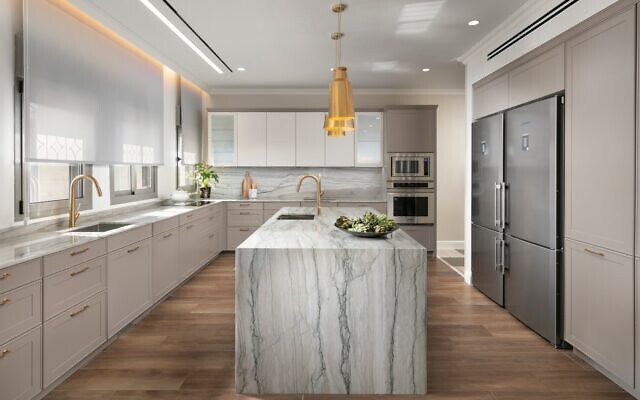
Gittie Perl kitchen (Elad Gonen for gp-interiors)
Describing trends she sees in those who commission her, Perl said her clients are looking for soft, calm tones. There is a movement away from cold grays and whites towards cozier beiges, pastels and wood finishes, together with curved shapes, nature-inspired design, and textured plastered walls.
“It’s all about creating the right peaceful home environment. People want their homes to be friendly and welcoming spaces for friends to come to,” Perl told The Times of Israel. “I’m also asked a lot for durable furnishings, and my clients want practical, easy-to-clean fabrics. They want to be relaxed and comfortable when they come on vacation and see their apartments as a place they’ll be choosing to spend a lot of time.”
Windows are also important. Buying a home in Jerusalem is all about seeing the city from different perspectives. “It’s a very special and unique place” said Perl. “I advise going for sunny south- and west-facing properties with window treatments that filter out the sun.”
“The apartments usually come with metal shutters but people don’t want to have these down during the day. Instead, they want layers of fabric which can filter out the strong light and add beauty to the space.”
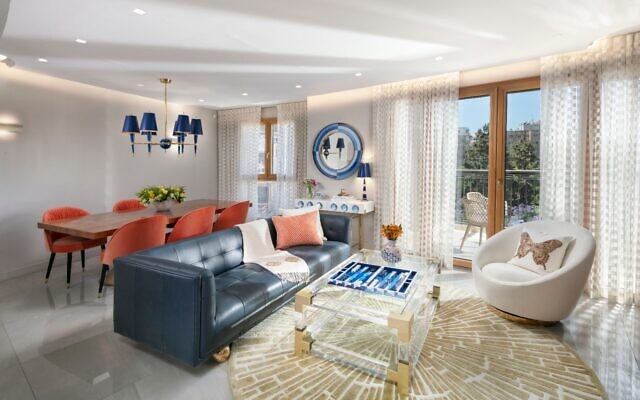
A living room in Jerusalem designed by Gittie Perl. (Courtesy)
Advanced technology requests are also core to what people are looking for when they instruct a designer to work on a home for them. Automating pretty much everything and hiding all the technology hardware is fundamental – leading to suspended ceiling spaces that can conceal whatever is necessary, and (important for Jerusalem winters) underfloor heating.
Her clients also want big dining rooms so that they can host family and friends for meals.

Gittie Perl designed bathroom (Simmy Jacobson for gp-interiors)
Sustainability is increasingly a trend in building projects, but it is also key to design. Clients want to manage the long-term costs of running a home with LED lighting systems and similar. And they also want smart solutions to manage the heat.
As home has become a place to spend more time, Perl has found that she is being asked to pay more attention to outdoor spaces and creating a luxury environment on balconies and in gardens.
On a typical day, Perl wakes up to WhatsApp messages from her various overseas clients, then moves ahead to multiple tasks on the projects she has in hand – corresponding with tradespeople, selecting materials from tiles to curtains, sourcing furniture for clients, arranging for overseas deliveries. But she also has frequent visits to supervise jobsites, drafts with CAD to create working drawings, puts together mood boards, sends out quotes and handles payments, and makes sure to find time to browse around for inspiration.
“Israeli design is very cutting-edge both in technology and décor so it’s important that I stay ahead of the emerging interior trends to incorporate them into my schemes,” she told The Times of Israel.
Perl also firmly works in the luxury apartment sector. In Jerusalem, that is partly about location — areas close to the Old City, or one of the older neighborhoods filled with buildings from the early days of Jewish redevelopment, from the late 19th and early 20th century.
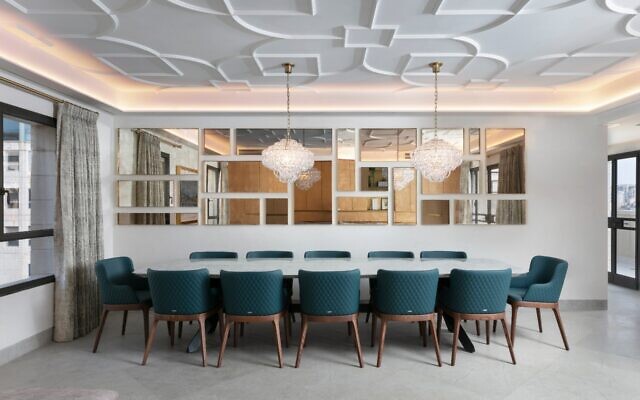
A dining area designed by Gittie Perl. (Courtesy)
These areas have brand-new developments, constructed either as extra floors on existing buildings (TAMA 38) or by demolishing (Pinui-Binui) buildings that were thrown up cheaply out of the necessity of housing a growing population and replacing them with properties designed to meet modern needs.
In Jerusalem, space is at a premium and even larger apartments in central neighborhoods may be small. Luxury design, therefore, means creating the feel of space, working largely with imported furniture and lighting (often Italian), or purpose-built furniture and hidden storage, and also using high-end materials — stone, wood, and marble — that can carry the feeling of luxury through the space, Perl explained.
People are looking for the latest in modern comforts and conveniences, she said. Those hunting luxury want future-facing furnishings that require minimal upkeep and stay looking good — like the best boutique hotels.
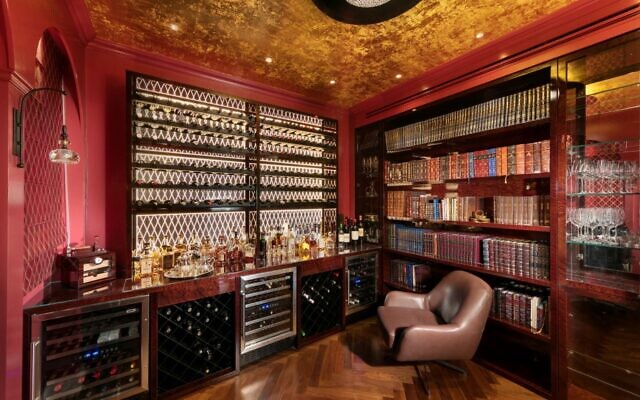
Custom carpentry is incorporated into this space designed by Gittie Perl. (Courtesy)
Perl is in the fortunate position of being able to choose the projects she works on.
“I deliberately choose those projects where I intuit that I can connect with the client and build a good relationship. My work takes me on a journey with my client. We become close during the entire process because you really get to know someone’s life when you work together hand in hand to create their home,” she said.
Clients put “their trust in me to deliver a high-end product so it’s crucial to have the right team whom I can trust to implement the design with a top-notch finish,” she said.
Perl laments that her greatest challenge is to find reliable craftspeople with the requisite skills at a reasonable price. She tries to tell her clients, many of whom are new immigrants, that they have to forget what they know from countries they have lived in before, and to better understand the Israeli market. She finds that the biggest chunk of a design budget almost always goes on custom carpentry.
Through the pandemic, Perl worked a lot for clients who had never visited the apartments they were buying, and rising prices together with a shortage of suitable homes forced people increasingly to look to places that required major refurbishment.
She learned how to manage design relationships long-distance and completed three projects from start to finish without ever sitting down around the table with the people she was working for during this period.
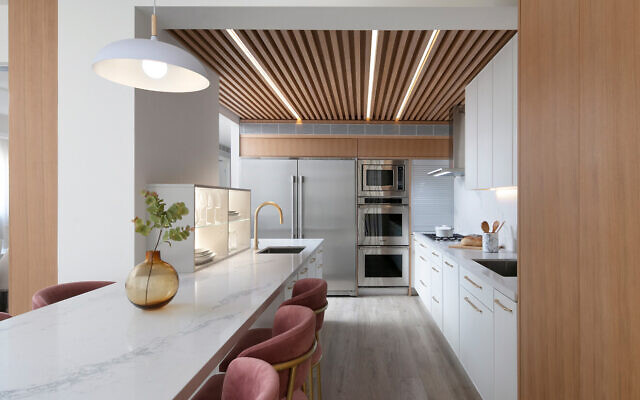
Kitchen design by Gittie Perl (courtesy GP-Interiors)
Perl acknowledges her work fills a particular niche for a particular type of client.
She doesn’t advertise as her name gets passed around from one client to another. But it works for both sides, and she’s often in communication with clients late into the night.
“I understand the needs of my type of client. And I feel so blessed that I can help my clients to fulfill their dream of living in Jerusalem,” she said.


